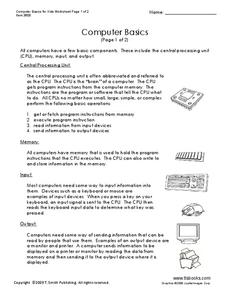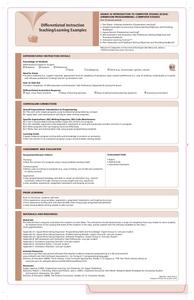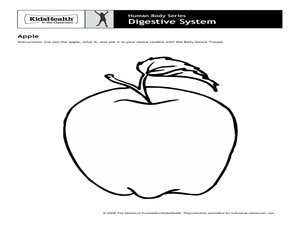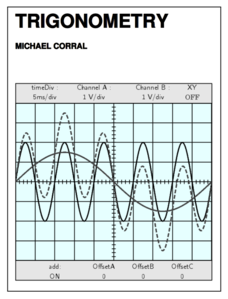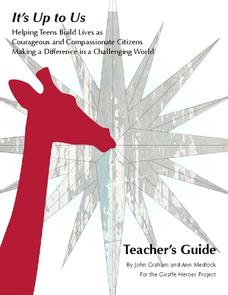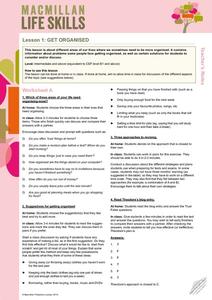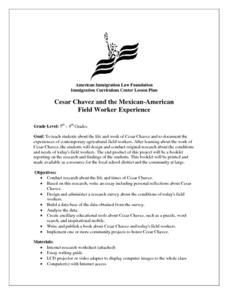T. Smith Publishing
Computer Basics for Kids Worksheet
This informational reading worksheet can be used in your literacy or computer class. Students learn the basic components of computers then test their knowledge with multiple choice and fill-in-the-blank questions.
Texas State Energy Conservation Office
Are Your Computers Wasting Energy?
After reading about the amount of energy that is used to power a personal computer, learners take a look at their own computer use and therefore, their energy consumption. They do this through a series of questions and computations on...
Ontario
Animation Programming—Computer Studies
Introduce high schoolers interested in animation programming to fundamental programming concepts so that they can plan and write simple programs.
Institute of Electrical and Electronics Engineers
Arduino Blink Challenge
Emerging engineers read about Arduino software and how it can be used. Then they follow a nine-step tutorial to connect an Arduino board to a computer and put it to work! The objective is to code a program that will cause an LED to...
Institute of Electrical and Electronics Engineers
Cracking the Code
Some interesting reading on the history of barcodes opens this technology lesson plan. Readers find out how engineers contribute, and then they gather into groups to discuss possible improvements to our current UPC barcode system. Know...
Scholastic
Study Jams! The Senses: Tasting
Mmmmmmm, here is a tasty little slide show to use when introducing upper-elementary learners to the sense of taste. Photographs and detailed computer images accompany explanatory text about how the taste buds and the nose send signals to...
Curated OER
Human Body Series - Digestive System
With articles entitled, "What's Puke?" and "What is a Fart?" this digestive system lesson is sure to be a gas! Elementary anatomists do a belly dance to illustrate how food moves through the digestive system and then design a board game...
Schoolcraft College
Trigonometry
This trigonometry textbook takes the learner from a basic understanding of angles and triangles through the use of polar coordinates on the complex plane. Written by a mathematician-engineer, examples and problems here are used to...
Scholastic
Study Jams! Animal Cells
Using stunning computer imagery, this resource introduces life science learners to cells. It zeros in on the animal cell and the function of its more prominent organelles. Additional support is offered in the form of a self-assessment...
Curated OER
Nonfiction Genre Mini-Unit: Persuasive Writing
Should primary graders have their own computers? Should animals be kept in captivity? Young writers learn how to develop and support a claim in this short unit on persuasive writing.
University of North Carolina
Blogs
The blogosphere may be overwhelmed with content, but there's still room for unique points of view. Creating a blog that stands out, however, is the bigger challenge. A handout on blogs, part of a series of handouts on specific writing...
Historical Thinking Matters
Spanish-American War: 5 Day Lesson
Nine historical documents, an interactive online notebook, and a fantastic opportunity for historical inquiry await your pupils in this 5-day lesson plan. Class members identify and discuss various causes for the Spanish-American War...
Giraffe Heroes Project
It’s Up to Us
The Giraffe Heroes Program is designed for teens willing to stick their necks out to make a difference, and to create community service projects that tackle real world problems. The resource guides teens to choose an issue, design a...
The New York Times
Kiev in Chaos: Teaching About the Crisis in Ukraine
Provide a historical context for the political unrest between Russia and Ukraine that began in late 2013. Learners review their prior knowledge and chronicle new understandings with a KWL chart, watch a video explaining the Ukrainian...
Pulitzer Center
International Aid and Fragile States
"States suffering from internal conflict, weak infrastructures, lack of economic development, and general instability are emerging as a large threat to the international security." What factors contribute to the creation of a fragile...
The New York Times
Sequencing the Stages: Understanding H.I.V. Infection at the Molecular Level
How does HIV operate at the molecular level? Pupils discover the progression from a healthy immune cell to one infected with HIV, watch an animation of the HIV life cycle, and finally identify each of the stages with illustrations on...
Atlanta History Center
Civil Disobedience and the Atlanta Student Movement
What tactics are used in civil disobedience? Learners study the conditions in Alabama that led to the establishment of the Atlanta Student Movement, as well as consider the nature and effectiveness of civil disobedience.
Macmillan Education
Get Organised
The focus of the first lesson in a 23-lesson life skills unit is on getting organized. The worksheets ask users to identify areas of their lives were they need more organization and then offer suggestions and solutions.
Creative Learning Exchange
The Infection Game: The Shape of Change
Encourage the spread of knowledge in your class with this cross-curricular epidemic simulation. Pulling together science, social studies, and math, this lesson engages students in modeling the spread of infectious diseases, collecting...
Fairbanks North Star Borough School District
Educator's Guide to Introducing Students to Google Docs
After learning how to create and name a Google Doc, individuals have the opportunity to share and collaborate with class members on a writing prompt assignment. Once grasped, students are encouraged to create a practice document on their...
PBS
Stories of Painkiller Addiction: Prescription Drug Abuse Awareness Campaign
The I-STOP law was designed to regulate the distribution and tracking of prescription drugs. After reading an article about its signing and implementation, middle and high schoolers work together to come up with their own ideas for an...
Penguin Books
A Teacher’s Guide to the Signet Classic Edition of George Orwell’s 1984
Whether you're new to using Nineteen Eighty Four in the classroom or you're an Orwell veteran, the materials in this teacher's guide are a valuable addition to your curriculum. The suggested activities prompt readers to create a newspeak...
Open Oregon Educational Resources
A Different Road To College: A Guide For Transitioning To College For Non-traditional Students
Registration. Prerequisite. Admission. Elective. With Alise Lamoreaux's informative eBook, A Different Road to College, prospective and current non-traditional college enrollees explore the language of college. They also learn how to...
American Immigration Law Foundation
Cesar Chavez and the Mexican-American Field Worker Experience
After researching and learning about the work of Cesar Chavez, your young historians will design a booklet on the conditions and needs of today's field workers and the Mexican-American field worker experience.


